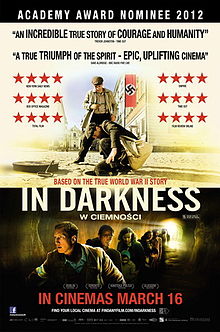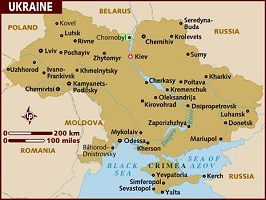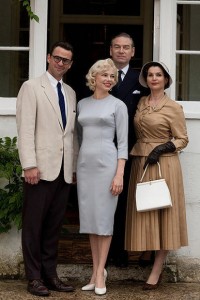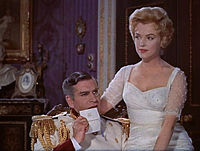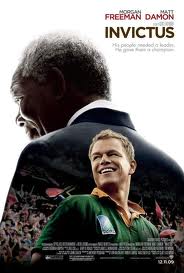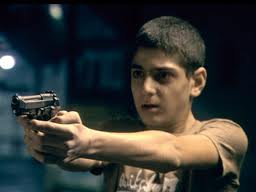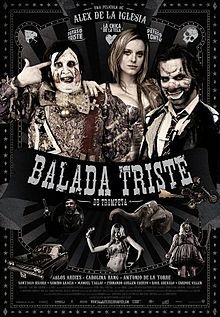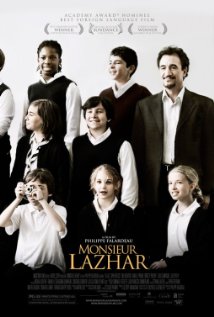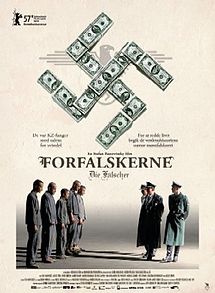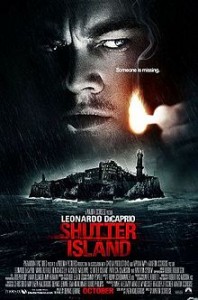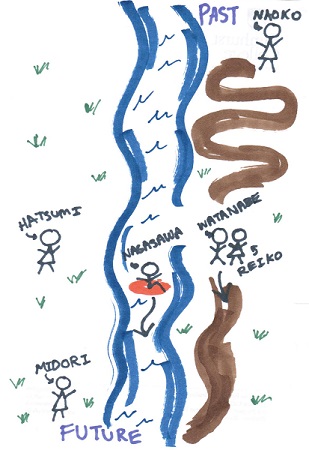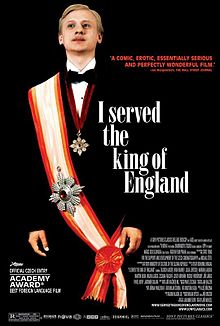 This movie is a Czech movie, not a British movie. Neither Great Britain nor the King appear at all. The Ethiopian emperor makes just a brief appearance. Therefore, if we watch this movie expecting a movie like The King’s Speech, we might think, “Huh???”
This movie is a Czech movie, not a British movie. Neither Great Britain nor the King appear at all. The Ethiopian emperor makes just a brief appearance. Therefore, if we watch this movie expecting a movie like The King’s Speech, we might think, “Huh???”
This movie is a satirical comedy with beautiful and grotesque images. However, in a sense, it can be said that this movie allows us to understand modern history of the Czech Republic through the protagonist’s life and the times he lives in. This movie depicts the dissolution of the Austro-Hungarian Empire after their defeat in World War I and the formation of the Czechoslovakia Republic in 1918; Hitler absorbing the Sudetenland region in 1939, followed by Czech becoming a German protectorate; the establishment of the communist regime with the support of the Soviet Union through the “Victorious February” of 1948; and finally ends around 1968. Based on the novel Bohumil Hrabal secretly wrote in 1970 when freedom of speech was oppressed in Czech under the control of the communist party, director Jiří Menzel, whose freedom to produce was also oppressed under the communist party, made a film adaptation in 2006 after the collapse of the communist party. In 1967, Jiří Menzel won the Academy Award for Best Foreign Language Film for Closely Watched Trains, another film adaptation of one of Bohumil Hrabal’s works, but there was a long gap in this career after that until the communist regime collapsed in 1989.
Czechs suffered throughout the 20th century—first bullied by Germany, then dominated by the Soviet Union—so we may expect the theme of Czech movies to be about this, but this movie depicts 20th century Czech history from a different angle. The Czech region Sudetenland shows up often in this movie.
The history of the Czech Republic is complicated. Bohemia was the center of the Czech Republic, but since the 11th century, German-ification has progressed due to Germans migrating there; also, there was a long-lasting, complicated power struggle between the north part of the Kingdom of Poland and the south part of the Kingdom of Hungary over ruling the land of Bohemia. Because of the eventual defeat of the Czech nobility in the Thirty Years’ War that started in 1618, a German sovereignty was established in Bohemia, but there historically was a strong antagonism between Germans and Czechs in the Bohemia region. Czech was traditionally anti-Germany, Pan-Slav, and had a strong sense of closeness with Russia, but this area in the end became a part of the Austro-Hungarian Empire. There are many coalmines in Bohemia. Utilizing the abundant coal and the investment by German capitalists, Bohemia successfully partook in the Industrial Revolution and became a prominent industrial area in Central Europe.
 Sudetenland was on the western edge of Bohemia and on the German border; this area had many Germans living there since ancient times and thus the most intense antagonism between Germans and Czechs. German citizens under the control of the Czech majority suffered from discrimination such as unequal hiring process. As a result of the defeat of Germany and Austria in World War I in 1918, the Austro-Hungarian Empire dissolved; Czech and Slovakia were merged and the independent nation of Czechoslovakia was formed. Anti-German thought was mainstream in Czech, but, conversely, in Slovakia near Russia, there were strong anti-Russia, pro-Germany thoughts. Czech invaded the Sudetenland and seized this land from Germany. Many scenes of Czechs bullying Germans appear in this movie. The bullying is depicted full of humor, but it is cruel when considered carefully. With a lightness and skillful movement by actors like that seen in Chaplin movies, this movie attracts the audience masterfully, but there is poison at the bottom that makes you think about various things.
Sudetenland was on the western edge of Bohemia and on the German border; this area had many Germans living there since ancient times and thus the most intense antagonism between Germans and Czechs. German citizens under the control of the Czech majority suffered from discrimination such as unequal hiring process. As a result of the defeat of Germany and Austria in World War I in 1918, the Austro-Hungarian Empire dissolved; Czech and Slovakia were merged and the independent nation of Czechoslovakia was formed. Anti-German thought was mainstream in Czech, but, conversely, in Slovakia near Russia, there were strong anti-Russia, pro-Germany thoughts. Czech invaded the Sudetenland and seized this land from Germany. Many scenes of Czechs bullying Germans appear in this movie. The bullying is depicted full of humor, but it is cruel when considered carefully. With a lightness and skillful movement by actors like that seen in Chaplin movies, this movie attracts the audience masterfully, but there is poison at the bottom that makes you think about various things.
For Hitler who succeeded in absorbing Austria in March of 1938, his next territorial ambition was Czechoslovakia; with the excuse that Germans living in Sudetenland were being persecuted, Hitler tried to gain sovereignty over Sudetenland. At that time, Czech was involved in conflicts with their neighbors Poland and Hungary over territory. Taking advantage of this situation, Germany gained sovereignty over Sudetenland and from there, absorbed Czech.
Mirrors are effectively used in this movie. A mirror reflects something back. This movie satirically reveals the true face of Czech through the non-mainstream Czech protagonist. The protagonist is a plain, small-statured Czech man who doesn’t attract attention from anyone and has blonde hair, which is rare for Czechs. He was a poor man when the Czech Republic was erupting in prosperity after their independence. While other Czechs bully Germans, he is the only man who helps Germans and he even marries a German women. When Nazis took control and began oppression of other Czechs, he was able to get a job at a high-end restaurant and a high-end hotel thanks to his wife. The high-end hotel looks to be the pinnacle of elegance, but the true characters of the rich people, high-salaried officers, and politicians that come here are exposed. Since the hotel employees never fail to follow, “After watching it all, pretend to see nothing,” the rich clients that come here don’t mind the eyes of the hotel employees at all. By depicting the protagonist, the movie provides a reflection of the people over different times like a mirror. Because the protagonist is an extremely wealthy person when Germany is defeated in World War II and the communist revolution comes to life, he is sentenced to 15 years in prison for this crime. After he is released, the protagonist is sent to Sudetenland and assigned to do heavy labor.
When the protagonist arrives, Sudetenland is deserted. After World War II, all Germans were forcibly deported. The movie suggests that terrible things such as being pillaged or massacred also happened and that being expelled was actually the most benign treatment. The movie ends with the protagonist in this deserted place in the middle of the mountains quietly looking back on his life. The two different actors who perform the protagonist when he was young and when he is old do not look alike. I think two actors are used to depict change in the protagonist’s personality. This movie depicts the protagonist over about 35 years, from adolescence to middle-age. It is usually enough to have one actor to perform this range of years.
This movie picks up the issue of Sudetenland, an issue not many Czechs want to touch since it is like a disgrace in the modern history of Czech. This movie is made as a comedy with beautiful images, but it is quite brave to raise the theme of the Sudetenland issue. It is especially admirable for the author of the original work Bohumil Hrabal to write a book about the Sudetenland issue back in the 1970s, long before an official resolution. Considering this, this light comedy may be asking Czechs including himself the terrifying questions of, “Did we not create the situation of becoming victims of Nazis ourselves? Are we not narrow-minded people for having held onto a hatred for a neighbor of a slightly different race?”

